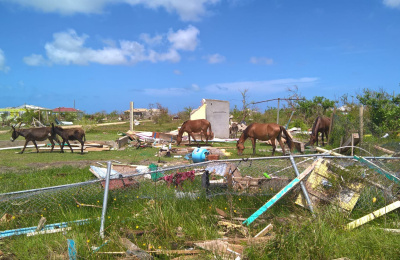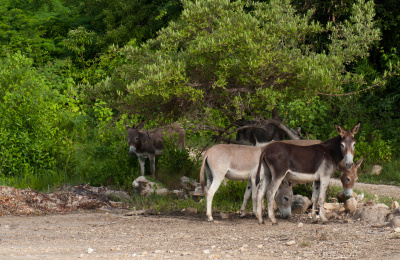The Donkey Sanctuary dispatched a team to Barbuda, one of the two major islands that make up the Caribbean nation of Antigua and Barbuda, to ensure the welfare of the island’s feral donkeys in the wake of Hurricane Irma.
In the second part of his report from the island, Simon Pope, Rapid Response and Campaigns Manager at The Donkey Sanctuary, meets a government minister and other key figures working hard to help Barbuda’s displaced donkey population.
Tuesday 3 October
“One of the reasons we’re participating in the Barbuda response is because we’ve been asked to, and being asked to is something of a privilege. It certainly hasn’t always been the case that animal welfare is a priority in emergency response situations. On many occasions in the past, responding to animal welfare issues hasn’t been seen as any sort of humanitarian issue, and therefore not a priority.
But things are changing, both at local and international level. Organisations like World Animal Protection, International Fund for Animal Welfare (IFAW) and Help In Suffering (HIS) have made the case for intervention and response for animals as being parallel efforts. And slowly but surely, governments are recognising the sense and importance of this.
All responses require collaboration between domestic organisations with knowledge and connections, but sometimes they have neither the resources nor the specific expertise. So we were honoured to get a call from Karen Corbin of the Antigua and Barbuda Humane Society asking for our donkey know-how and advice on the ground in Barbuda. Karen has been designated as the lead for all animal welfare groups to ensure that efforts aren’t being duplicated. She also has very good relationships with key government ministers and works seamlessly with them to overcome any obstacles.
So alongside Karen Corbin and World Animal Protection, we found ourselves sitting round the table with the Honourable Molwyn Joseph, Minister for Health and the Environment. The minister began by thanking everyone for their rapid response. He wanted us all to know that the determination to ensure a response for animal welfare in the wake of the disaster was intended to demonstrate to the global community that they saw no separation in times of emergency between the needs of humans and of people. He wanted this to be interpreted a sign that they took their responsibilities towards animals very seriously and that they wanted their progressive stance to be adopted by others.
The minister asked if we would submit a proposal that would resolve a long-standing argument about donkeys on Barbuda – the size of its population. We’ve heard wildly varying opinions about the number of donkeys on Barbuda, ranging from 120 to as many as 5,000. Our own view is that there is nothing like as many as 5,000, but probably a few hundred more than 120. We’ll be able to suggest a number of ways in which we can produce accurate figures, by conducting ground and aerial surveys. Why is this important? Well, it should mean that some of the negativity towards donkeys might dissipate if it’s established that there are far fewer than many people claim. Even the minister spoke very fondly of the donkeys that his father had, and those he had around him while growing up.”
The team will continue to assess the situation in Barbuda and report back regularly to the UK – we’ll be posting further updates from the emergency team on our website.


